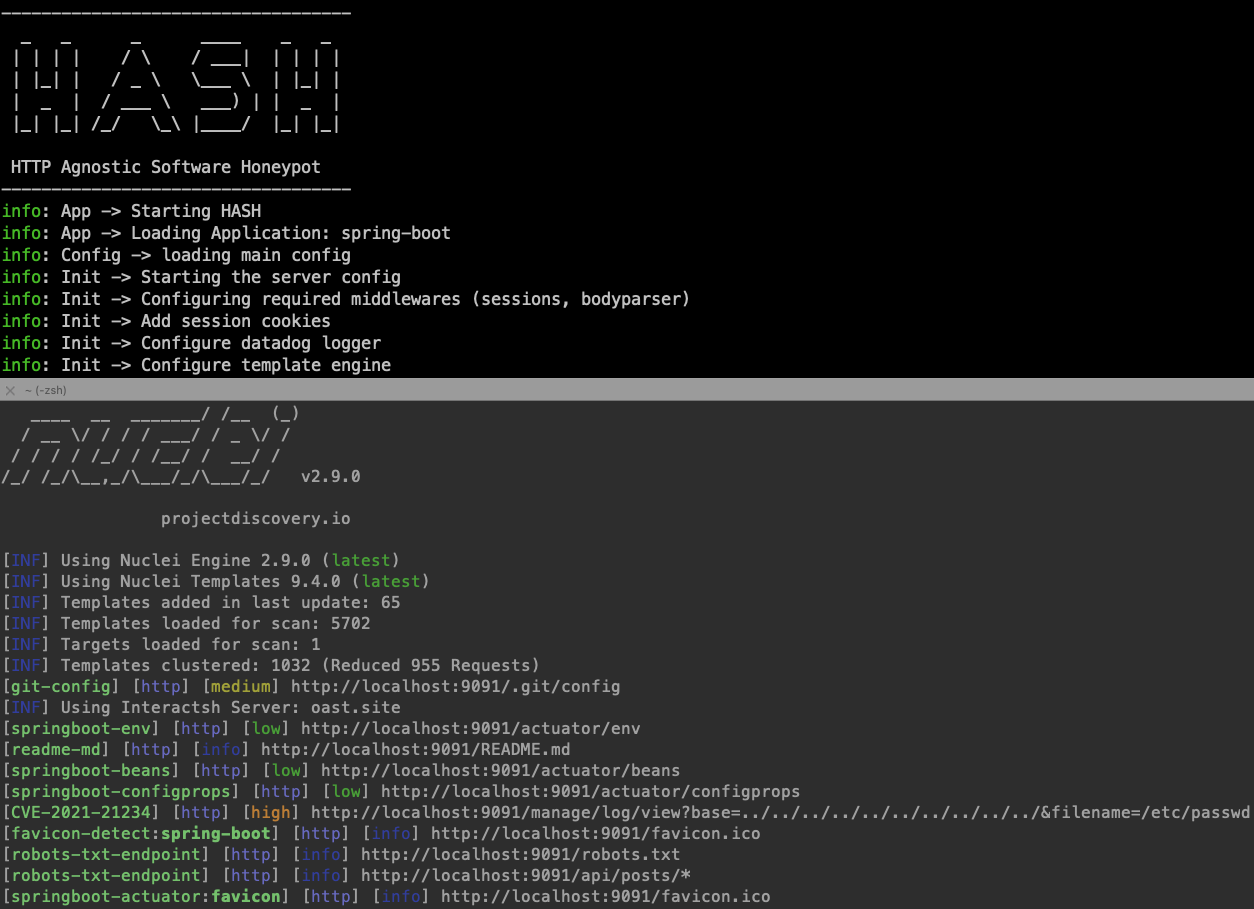hash-honeypot
v1.0.4
Published
HTTP Agnostic Software Honeypot (HASH) - honeypot framework to build low interaction honeypots
Downloads
80
Readme
HASH (HTTP Agnostic Software Honeypot)
HASH is a framework for creating and launching low interactive honeypots.

🌟 Why HASH?
The main philosophy of HASH is to be easy to configure and flexible to mimic any software running on HTTP/HTTPs. With the minimum footprint possible to avoid being detected as honeypot.
⚡ Features
- Single framework to deploy HTTP/HTTPs based honeypots
- Easily configurable via YAML files
- Built-in honeytraps
- Powerful randomization based on
fakerjsto avoid honeypot detection - Optionally, integration with Datadog to ingest and analyze honeypots logs and HTTP requests through APM
🚀 Getting Started
HASH is built using Node.js but it can mimic any web-based language / server based on the configuration. Read the full docs below.
Installation
You can Install it via NPM
npm install -g hash-honeypotOr you can use it directly from docker
docker run --rm ghcr.io/datadog/hash helpUsage
Generate honeypot profile
HASH uses YAML files to configure how it simulate the desired software, The typical structure for the profile folder is the following
|____templates
| |____resources
| | |____index.html
| | |____style.css
| | |____favicon.ico
| |____404.yaml
| |____default.yaml
|____init.yamlYou can build it yourself or you can generate it using generate command
Usage: HASH generate [options] <folder>
Generate honeypot profile
Arguments:
folder path/to the app
Options:
-t --template <template_name> base template (default: "default")
-n --name <honeypot_name> Honeypot name
-s --swagger <swagger_file> Path to swagger file to convert
-h, --help display help for commandExample
hash-honeypot generate myhoneypot --name my-honey-pot --template defaultYou can also convert swagger files to honeypot directly from the generate command
Example converting swagger file(s) to honeypot
hash-honeypot generate sample-swagger2 -n sample -s ./test-swagger/test-swagger.yamlRunning the honeypot
Usage: HASH run [options] <folder>
Run HASH
Arguments:
folder path/to the template folder
Options:
-l, --log <transport> logging transport (default: "console,file,datadog")
-f, --log_file <filename> logging filename (default: "hash.log")
-h, --help display help for commandexample
hash-honeypot my-honeypot-profile -l file -f ./logs/hash.logIf you are using Datadog for logs make sure you export the datadog api key
export DD_API_KEY=<your-api-key>
Customization and configuration
You can customize the your honeypot profile as you want
Example request template:
id: sqli-error
info:
title: 'SQL error honeytrap'
requests:
- isTrap: false
expect:
method: GET
path: '/author/:Id([0-9]+)'
reply:
status: 200
headers:
content-type: 'text/html'
body:
view: 'author.html'
- isTrap: true
expect:
method: GET
path: '/author/:Id'
reply:
status: 500
headers:
content-type: 'text/html'
body:
contents: "You have an error in your SQL syntax; check the manual that corresponds to your MySQL server version for the right syntax to use near '' at line 2"Read the configuration reference here or see the examples here.
Future work
- [x] Create examples folder to show HASH features
- [x] Ability to import API documentation formats (swagger ..etc)
- [x] Package hash as module for easier distribution
- [ ] Add capabilities for medium interactions
- [ ] Add popular honeytraps
- [ ] Add unit & integration tests
License and Contribution
Released under the Apache-2.0 license, contributions are welcome!
Contact
Feel free to open an issue, or reach out at [email protected].
